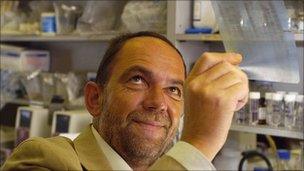MPs to probe closure of Forensic Science Service
- Published

The FSS has provided important DNA evidence in numerous high-profile cases
The Commons science committee has said it is to hold an inquiry into the closure of the UK government-owned Forensic Science Service (FSS).
On 14 December, the government said the service would be wound up, adding that as many of its operations as possible were to be transferred or sold off.
The FSS analyses evidence from crime scenes in England and Wales, but has been losing about £2m a month.
It employs 1,600 people and analyses more than 120,000 cases each year.
Evidence provided by the FSS was key to the arrest of serial killer Steve Wright and in the case of missing girl Shannon Matthews.
The service is regarded as a world-class organisation that has been at the forefront of innovation in forensics.
The government wants private enterprise, which currently makes up 40% of the market, to fill the gap left behind by the FSS.
Online petition
At the time of the government's announcement, Crime Reduction Minister James Brokenshire said private sector competition for police contracts was enabling forces to achieve greater efficiency.
He said that the Forensic Science Regulator should ensure that quality standards are maintained.
But other commentators warn that an over-emphasis on profits could threaten the quality of science.
The terms of reference for the Commons Science and Technology Committee's inquiry are as follows:
What will be the impact of the closure of the FSS on forensic science and on the future development of forensic science in the UK?
What will be the implications of the closure on the quality and impartiality of forensic evidence used in the criminal justice system?
What is the financial position of the Forensic Science Service?
What is the state of, and prospects for, the forensics market in the UK? Specifically whether the private sector can carry out the work currently done by the FSS. The volume and nature of the forensic work carried out by police forces will also be examined in this light.
What are the alternatives to winding down the Forensic Science Service?
So far as they are known, are the arrangements for closing down the FSS, making staff redundant and selling its assets adequate?
Supporters of the FSS have also set up an online petition, calling for the service to be saved. So far, the petition has collected about 19,000 signatures.
Job losses
In a letter to The Times newspaper last month, forensic experts strongly urged the government to reconsider the decision.
Scientists said the move would see the UK lose its position as a leader in the investigation of crime scene evidence.

DNA profiling pioneer Sir Alec Jeffreys is among those who signed a letter to The Times
Forensic geneticist Professor Niels Morling, who co-ordinated the letter, said the announcement of the closure had been greeted with "disbelief and dismay".
Professor Morling, from the University of Copenhagen in Denmark, said in an editorial: "It is clear that an organisation that offers world-leading research will never be able to compete with commercial suppliers that focus on the lowest cost and highest efficiency. Nor should it."
He added: "An independent second opinion is crucial in forensic science, and this should come from government and academic laboratories."
Many also doubt that the private sector will take up the role of developing and refining new technologies. This could mean that UK forensic labs will be unable to offer the most up-to-date techniques in order to solve serious crimes.
The Home Office says the service is expected to be wound up by March 2012, with the loss of 1,600 jobs.
- Published28 December 2010
- Published14 December 2010